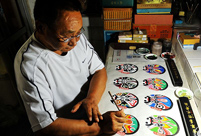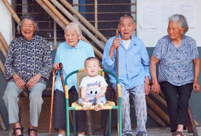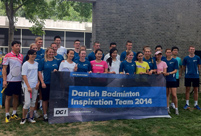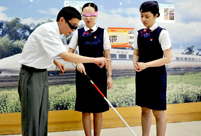 Global ambassadors of ecotourism gather in Nanjing
Global ambassadors of ecotourism gather in Nanjing
 Taiwan woman marries into Kazak family, 100 sheep plus a flat as dowry
Taiwan woman marries into Kazak family, 100 sheep plus a flat as dowry
 College girls take graduation photos under water in Chongqing
College girls take graduation photos under water in Chongqing
 Cartoon: Xi and football
Cartoon: Xi and football
 Chinese influence sweeps ROK
Chinese influence sweeps ROK
 Post-90s beauty boxer grapples four men
Post-90s beauty boxer grapples four men
 3,000-year-old tea town through lenses
3,000-year-old tea town through lenses
 22 archaeological sites along Silk Road in China
22 archaeological sites along Silk Road in China
 Football babies, Samba dancers embrace 'World Cup'
Football babies, Samba dancers embrace 'World Cup'
 Beautiful scenery along China’s Grand Canal
Beautiful scenery along China’s Grand Canal
A drug user has set up home in the fi elds around Ruili.[Photo by Jiang Dong / China Daily]
Free treatment
Li Zhoulin, deputy director of Ruili's Center for Disease Control and Prevention, said that since October the Yunnan Provincial Health Authority has been providing free AIDS treatment and follow-up checks for patients from Myanmar who face financial difficulties.
The patients include the spouses of local Chinese, plus some injection drug users, or IDUs, and sex workers who cross the border frequently.
"In many cases, the treatment for patients works as a preventative measure for other people, too," Li said.
Initially, the services were only available to Myanmar nationals married to Chinese citizens, but since the start of the year the program has been extended to needy patients who visit China regularly, or work and live in the country.
However, there are concerns about the delivery of the checkup services and patient management.
"Some, particularly the IDUs and vagabonds, are hard to contact, and treatment compliance is very difficult to ensure," Li said, adding that poor compliance, which leads to heightened resistance to medicines, can be fatal.
Jia Manhong, deputy director of the Yunnan provincial CDC, said about 100 people from Myanmar are receiving free antiretroviral drugs in Ruili, and now other border towns and counties, such as Xishuangbanna, Longchuan, and Mangshi, are following suit.
Official figures show that Ruili has 7,700 people with HIV - the second-highest prevalence incidence rate in China after Liangshan in Sichuan province - and 53 percent of the sufferers come from Myanmar.
"Things appears to be getting worse," Li said, noting that of the 508 newly diagnosed sufferers in Ruili last year, 80 percent were Myanmar nationals who work in the city.
"We have to do something to reverse the trend. It doesn't matter that the people are not Chinese," he said.
Luo Guangju, a 34-year-old from Muse who married a Chinese man and moved across the border in 2005, said the services are essential and greatly appreciated.
Luo discovered she was HIV positive in 2007 when she gave birth to her daughter at a hospital in Ruili. The girl has a clean bill of health, so far.
"I've been on ARV drugs at the Better Clinic for six months. I gained some weight after the medication and feel OK now. I live in China as a wife and mother, so it's difficult for me to go back to Myanmar for treatment," Luo said, smiling diffidently.
Her husband, a welder, only tested positive for HIV in 2009, when their daughter turned 2 years of age, and has been on treatment since. "He didn't care, and we had unprotected sex," Luo said.
The couple makes about 4,000 yuan a month, according to Luo, who said, "China has better job opportunities, so I think we will stay here."
Previous Page1234Next Page Previous Page1234Next Page
 |  |
 How Chinese men kill the time when their wives practice square dancing?
How Chinese men kill the time when their wives practice square dancing? Chinese Navy frogmen in training: photos
Chinese Navy frogmen in training: photos Lishui, city of longevity with 186 healthy men above 100 years old
Lishui, city of longevity with 186 healthy men above 100 years old Hong Kong Fashion Festival kicks off
Hong Kong Fashion Festival kicks off Germany crush Brazil to advance to World Cup final
Germany crush Brazil to advance to World Cup final Danish badminton team plays Chinese social media users on Asia tour
Danish badminton team plays Chinese social media users on Asia tour Art on eggshells
Art on eggshells Test flight of Russian amphibian BE-103 in Shenyang, NE China
Test flight of Russian amphibian BE-103 in Shenyang, NE China Stewardesses of CHR trains experience walk with white cane
Stewardesses of CHR trains experience walk with white cane Chengdu police use social media to boost recruitment
Chengdu police use social media to boost recruitment Secrets unveiled in restoration of the 800-yr-old Buddha
Secrets unveiled in restoration of the 800-yr-old Buddha Heavenly path in Chongli grassland
Heavenly path in Chongli grassland Happy Birthday to "Yuanzai"
Happy Birthday to "Yuanzai" China's manned submersible Jiaolong opens to public
China's manned submersible Jiaolong opens to public Roast Duck Restaurant celebrates 150th anniversary
Roast Duck Restaurant celebrates 150th anniversaryDay|Week|Month